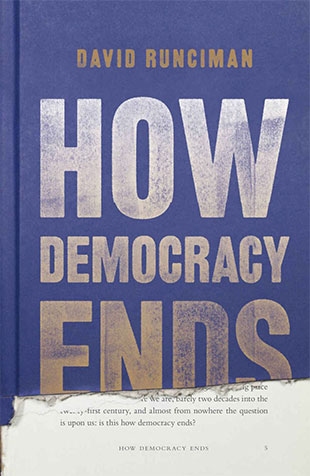"Churchill was only half right. Democracy remains the least worst option for many of us, for now. But it is not the least worst option for everyone. There are realistic alternatives. The twenty-first century is likely to see Western democracy confronted by a rival political system whose appeal will vary from place to place and will occasionally stretch to include the edges of our politics. The temptations are real, even if the alternative is currently unrealistic for most Western societies. Democracy is no longer the only game in town.
"Equally, we should recognize the limits in the trade-off we have chosen. The kind of respect provided by representative democracy may prove insufficient for twenty-first century citizens. The premium democracy places on personal dignity has traditionally been expressed through extensions to the franchise. Giving people the vote is the best way to let them know that they count. But when almost all adults are able to vote, we inevitably look for new ways to secure greater respect. The rise of identity politics is an indication that taking part in elections is not enough any more. Individuals are seeking the dignity that comes with being recognized for who they are. They don't just want to be listened to. They want to be heard. Social networks have provided a forum through which these demands can be voiced. Democratic politicians are struggling to know how to meet them.
"The politics of recognition is an extension of democracy's appeal rather than a repudiation of it. Authoritarianism is no answer here, regardless of how pragmatic it is — it just results in political leaders who try to drown out demands for recognition with even louder demands of their own. You want respect? the authoritarian says. Then respect me! But representative democracy may not have the answers either. It is too mechanical to be convincing, once the stakes for respect get raised. Elected politicians increasingly tiptoe around the minefield of identity politics, unsure which way to turn, terrified of giving offence. If this continues, then the attraction that has held democracy together for so long will start to fray. Respect plus results is a fearsome combination. One without the other may not be enough."
"However, this line of thought leads to a more radical possibility. If we can't continue to have personal respect plus good collective outcomes, perhaps we should pick between them. Maybe it is not a trade-off. Maybe it is a straightforward choice. If we insist that every voice counts, then we shouldn't be surprised that politics turns into a cacophonous mess. If we want the best results, perhaps we should limit political input to the people who know best how to achieve them.
"Twenty-first century authoritarianism can provide a partial, pragmatic alternative to democracy. There is a more dogmatic alternative, which has its roots in the nineteenth century. Why not ditch the dignity that comes with voting altogether? Give up on personal respect — it's not worth it. Respect the experts instead!
"Should we try it?"
